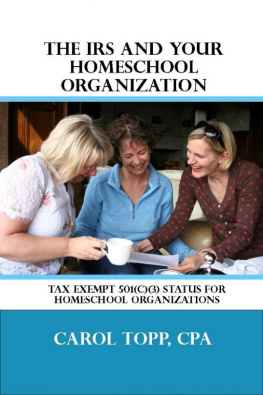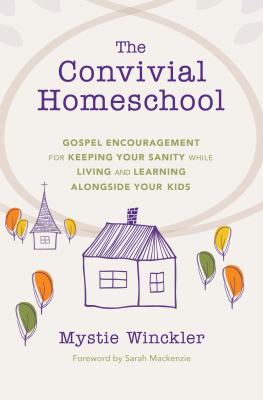The IRS
and
Your Homeschool Organization
Tax Exempt 501(c)(3) Status For HomeschoolOrganizations
By Carol L. Topp, CPA
Copyright 2011 by Carol L. Topp, CPA
All right reserved
ISBN-13: 978--1-4659-8199-8
BISAC: Education / Home Schooling
No part of this book may be reproducedwithout written permission of the author except for briefquotations and for reviews
Smashwords Edition, License Notes
This ebook is licensed for your personalenjoyment only. This ebook may not be re-sold or given away toother people. If you would like to share this book with anotherperson, please purchase an additional copy for each recipient. Ifyoure reading this book and did not purchase it, or it was notpurchased for your use only, then please return to Smashwords.comand purchase your own copy. Thank you for respecting the hard workof this author.
Disclaimer and Limitation of Liability
This book is designed to provide accurate andauthoritative information about the subject matter covered. Theauthor is not rending legal, accounting, or other professionaladvice. Any tax advice contained in this book was not intended orwritten to be used, and cannot be used, by any taxpayer for thepurpose of avoiding penalties that may be imposed under theInternal Revenue Code or applicable state or local tax lawprovisions. Furthermore, this book was not intended or written tosupport the promotion or marketing of any of the transactions ormatters it may address.
Please visit www.HomeschoolCPA.com or e-mailthe author at Carol@HomeschoolCPA.com
Homeschool Contact With The IRS
Government Intrusion into Homeschoolers'Lives
Historical Perspective on Charities andTaxes
Does Tax Exempt Status Limit HomeschoolFreedoms?
Definition
Support Groups
Comparison of 501(c)(3) Qualified Charity and501(c)(7) Social Club
What if Were Not a Charity?
Can My Homeschool Be Tax Exempt?
Common Non Profit Forms
Benefits of 501(c)(3) status
Disadvantages 501(c)(3) status
File for 501(c)(3) Qualified CharityStatus
Determine Eligibility of Other Tax ExemptStatus with the IRS
Reorganize Your Group to Stay Small
Pay Taxes
How to Decide What to Do
Secretary of States Office
Attorney General's Office
Department of Revenue
Are You Ready?
Writing a Mission Statement
Establishing a Board of Directors
Writing By Laws
What is Incorporation
Do You Need to Incorporate?
What Does Incorporating Involve?
Choosing Your Name Carefully
Seven Great Reasons to Incorporate
IRS Form 1023
Narrative
A Board and Bylaws
Financial Statements
Annual Reporting to the IRS and YourState
Unrelated Business Income Tax
Disclosure Requirements
Donations
Political limitations
Conflict of Interest
Sample Mission Statements
Sample Bylaws
Sample Articles of Incorporation
Sample Conflict of Interest Policies
***
As the homeschooling movement grows, so doour support groups, co-ops, music and sports programs! This growthmeans more organization and more structure and needed forhomeschool groups.
Perhaps your group has grown and your arewondering if you have any obligation to the IRS. Perhaps your boardis asking about being officially recognized as a nonprofitorganization. Youve heard terms like nonprofit, tax-exempt and501(c)(3). Do you understand what they mean?
You may wonder what nonprofit status mightmean for your group-good and bad. What are the benefits? What willit cost in dollars and time? Is it needed? Is your group ready?
This book will help you sort out thedecisions you need to make. I will discuss the different types ofhomeschool groups and when they need to worry about taxes and theIRS. I'll explain the pros and cons of being a nonprofitcorporation and obtaining 501(c)(3) tax exempt status.
Unlike other books on this subject, I amwriting specifically to homeschool organizations. I know how theyoperate and understand their mission. I also know what it is liketo be a homeschool leader. You want clear answers and dont havetime to read a lot of books or websites. You have no desire tobecome an expert in nonprofit law because your just want to run aprogram that benefits homeschooling families.
My goal in this book is to clear theconfusion and offer practical assistance. I hope you find ithelpful.
Carol Topp, CPA
Cincinnati, Ohio
***
I'm a homeschool leader and I'm wondering ifmy group is supposed to be paying taxes to the IRS.
What happens when a homeschool group makes aprofit? Do they owe taxes? Is there paperwork with the IRS? Shouldwe hire an accountant?
Homeschool leaders frequently ask questionslike the ones above. They are concerned about paying taxes andfiling forms, but unlike personal income taxes, homeschool leadersare in unfamiliar territory. They are unsure if their homeschoolgroup is a business or a nonprofit organization and questionwhether being a nonprofit means they do not owe any taxes. Leaderswonder what their involvement should be with the Internal RevenueService (IRS).
Homeschool Contact With The IRS
There are several situations when ahomeschool organization should be in contact with the IRS:
Your homeschool group opens a checkingaccount and needs a tax identification number.
Usually the first contact a homeschoolorganization has with the IRS is getting an Employer IdentificationNumber (EIN). Most banks now request an EIN when a group opens achecking account. An EIN is similar to a Social Security Number fora business or nonprofit organization. They are available from theIRS at no charge at ww.irs.gov.
Your homeschool group pays a worker.
Your worker may be an independent contractoror an employee. Either way, there are forms to file with the IRS atthe end of the calendar year (typically a W-2 or a 1099MISC).Additionally, there are employer taxes, such as Social Security orMedicare taxes to pay in addition to worker wages.
Your nonprofit homeschool organization bringsin income of more than $5,000 in a year.
If your annual gross revenues are more than$5,000 and you have an educational, religious or charitablepurpose, your organization should file for tax exempt status as a501(c)(3) charitable organization with the IRS. Approval of taxexempt status by the IRS means that your group will not pay incometax on its profit or financial surplus.
Your homeschool group is run as a for-profitbusiness.
Most homeschool organizations are operated asnonprofit organizations governed by a board and bylaws, butincreasingly some homeschool groups are for-profit businesses. Theywill need to have a tax number (called an Employer IdentificationNumber or EIN) and file tax returns, such as the Form 1040 ScheduleC Business Profit or Loss.
Your group makes money from fund raisers,selling T-shirts and other merchandise, or selling advertising onyour website.
Homeschool groups often make money fromactivities not related to homeschooling. The IRS calls income fromthese activities unrelated business income (UBI) and will tax theprofit from these activities. Usually homeschool groups avoid theUBI tax by using one of the IRS exemptions (volunteer labor,selling donated merchandise or unrelated business income of lessthan $1,000 annually).
The remainder of this book or some of myother books (Money Management in a Homeschool Organization andPaying Workers in a Homeschool Organization) will discuss these IRSissues in more detail.
Government Intrusion into Homeschoolers'Lives
As a whole, homeschoolers avoid governmentintrusion in their lives. They have decided to turn down the publiceducation offered to them by their local government and educatetheir children on their own, so naturally, many homeschool leadersare resistant to local, state or federal governments interferingwith their right to homeschool. This resistance continues when theywish to band together in homeschool co-ops or support groups andfind themselves facing taxes, IRS rules and employmentregulations.
Next page












